Jan 15, 2024
Education in the digital age: TU Dresden and HS Stralsund complete successful VCL project
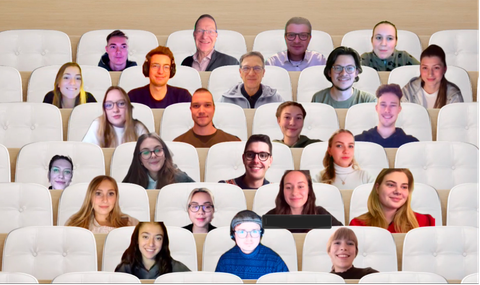
Students of the module "Case based learning in the virtual classroom"
At a time when digital skills are becoming increasingly important, Dresden University of Technology and Stralsund University of Applied Sciences have reached an important milestone in their academic collaboration. Their joint teaching project within the framework of Virtual Collaborative Learning (VCL) has been successfully completed. This project, the first of its kind for Stralsund University of Applied Sciences and one of many for TU Dresden, aimed to provide students with practical experience in the areas of teamwork, conflict management, collaboration and communication.
Digital transformation
The VCL project, which took place under the thematic focus of digital transformation, offered students a unique opportunity to engage with the challenges and opportunities of the digital age. By focusing on business models, digitalization and human resource management, participants were prepared to develop effective and innovative solutions in their future careers.
The case study: Climate-neutral Dresden
The project focused on a practical case study: the mission to make the city of Dresden climate-neutral. The students dealt with the challenge of implementing more charging stations, e-cars and environmentally friendly measures in the city. The collaboration with local electricity suppliers and a car manufacturer offered students the opportunity to analyze real business areas and develop new business models that focus on the mobility sector.
Workshops and tasks
During the six-week VCL project at Dresden University of Technology and Stralsund University of Applied Sciences, students were confronted with a series of challenging and interactive tasks. These tasks were carefully designed to provide participants with both theoretical knowledge and practical skills that are essential for tackling real-world challenges in the field of digital transformation. One of the first tasks was the creation of a PESTLE analysis. This analysis served to develop a comprehensive understanding of the external influencing factors affecting the mobility industry and specifically the introduction of e-cars in Dresden. The students examined political, economic, social, technological, legal and environmental aspects in order to obtain a holistic picture of market conditions and possible future scenarios.
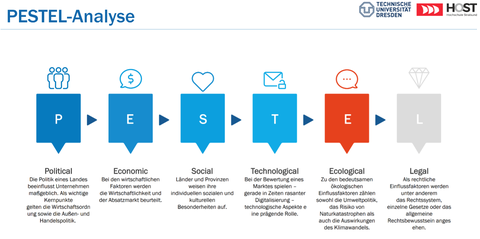
Task in week 2: PESTLE analysis
Another focus was on the development of business models using the Platform Business Model Canvas. The students were introduced to the basic principles of business model design, particularly in relation to digital platforms. They independently developed business models that were specifically tailored to the needs and challenges of urban mobility in Dresden. This exercise enabled students to translate theoretical concepts into practice-oriented, innovative and feasible business plans.
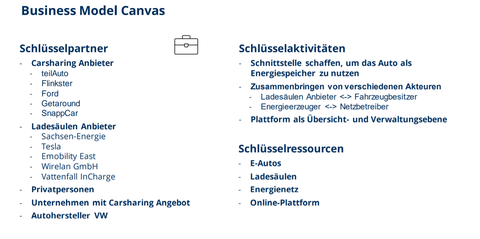
Task in week 3: Business model Canvas
The next part of the project was the development of customer journeys and the identification of customer touchpoints. The aim of this task was to develop a deep understanding of customers' needs, expectations and experiences. The students created detailed customer journey maps that depicted a customer's path from first becoming aware of a product or service through to long-term customer loyalty. They identified key touchpoints and considered how these could be optimized to ensure a positive customer experience. In addition to the customer journeys, the students also looked at the development of revenue models and strategic planning. They explored different approaches to generating revenue and evaluated which business forms and distribution strategies would be best suited to their business models. This holistic approach was crucial in order to develop realistic and marketable business plans.
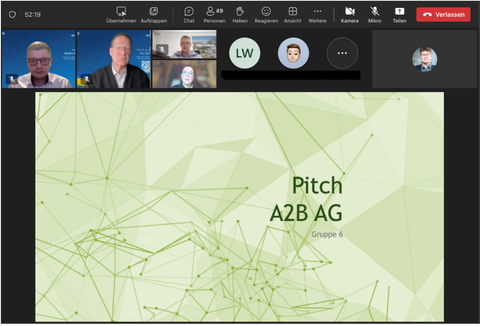
Student's pitch: A2B AG
The highlight of the VCL project was a final pitch in which the students had the opportunity to present the ideas and business models they had developed. For this pitch, they developed pitch decks that contained a summary of all their work. This pitch was intended to be not only a demonstration of their acquired knowledge, but also a platform to effectively demonstrate their skills in persuasion and communication.
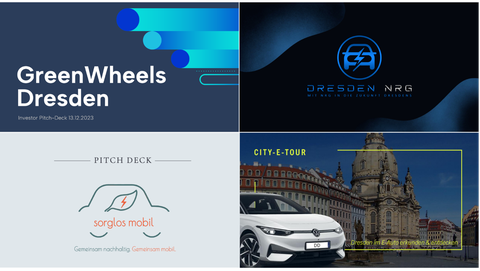
Corporate Identities of Student's fictive companies
The VCL project between TU Dresden and HS Stralsund has not only shown how fruitful cooperation between different educational institutions can be, but also how important it is to prepare students for the demands and challenges of the digital future. Projects like this pave the way for a new generation of specialists who are ready to take on the challenges of a constantly changing world.
